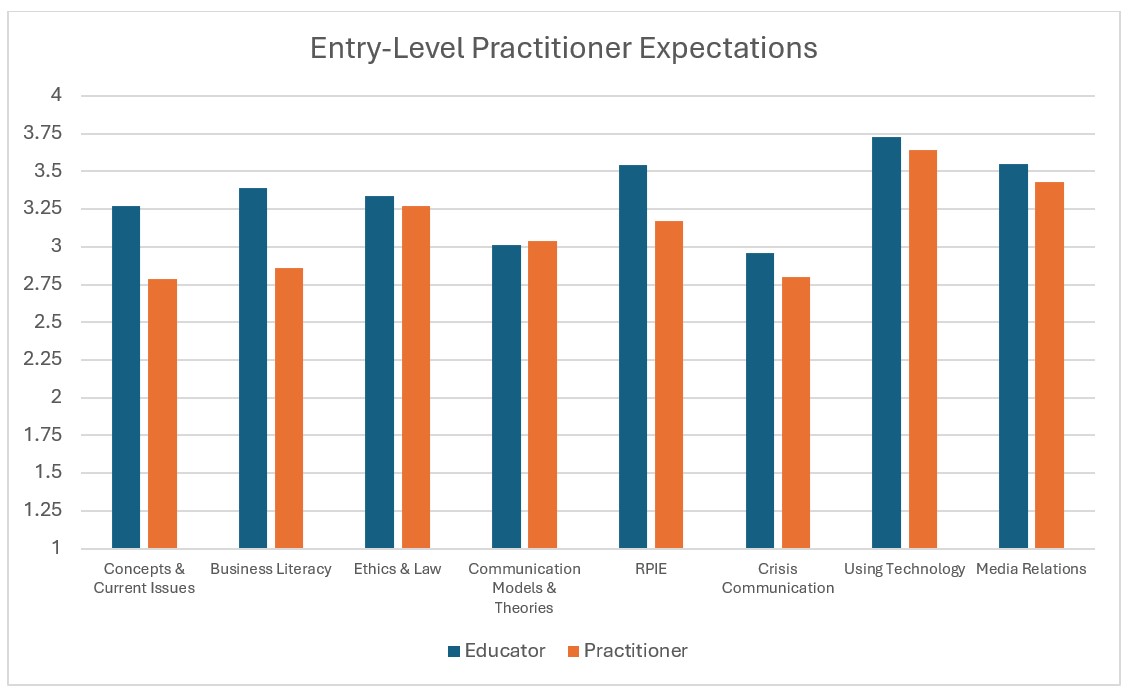The Latest Practice Analysis: Identifying the Core Competencies Necessary in Public Relations Today
By Marlene S. Neill, Ph.D., APR, PRSA Fellow
May 2025
To ensure that Accreditation exams are current with the demands of public relations today, the Universal Accreditation Board (UAB) conducts survey research every five years with both educators and practitioners. The most recent survey was conducted in Spring 2024, resulting in minor changes to the APR exam and Certificate in Principles of Public Relations exam that were approved at the July 2024 UAB meeting in New York City.
The survey sample consisted of 328 practitioners and 74 educators, for a total of 402 people. The full results of the study were published in the January issue of Corporate Communications: An International Journal.
The 2024 survey was the first time the UAB assessed the adoption rates of AI. The results revealed that practitioners were using AI somewhat for content creation, but only a little for crisis and issues management or research, and they also reported minimal involvement in advising others on ethical and legal issues associated with AI.
At the same time, there was a strong demand for technology skills for both entry-level and mid-career professionals. Based on these results, the UAB added language to existing competencies (KSAs) to encourage the development of exam questions that deal with using technology for research, implementation and evaluation of programs, as well as managing issues and crisis communication and leading the public relations function.
The most significant change from the 2024 practice analysis study was the addition of a new competency for the Certificate in Principles of Public Relations exam — Building & Maintaining Relationships, which accounts for 10% of the exam questions. This change was based on open-ended responses from both educators and practitioners who indicated there was a specific need for competencies related to “building relationships with co-workers and others in their chosen industry,” “community engagement,” and “conflict resolution and team building.” To allow for this new competency to be added, Researching, Planning, Implementing & Evaluating Programs (RPIE) was reduced from 45% to 35% of the exam content.
In the full report, the 2024 practice analysis results were compared to the previous studies in 2010, 2015 and 2020. What the data revealed is that the competency demands for public relations practitioners have significantly increased in all areas (See Chart 1).
Chart 1: Comparison of Practice Analysis Results by Year
-chart.jpg?sfvrsn=3db844e2_0)
One surprising result was that practitioners rated business literacy quite low as an expected competency for entry-level practitioners (See Chart 2). This was unexpected because the 2024 report from the Commission on Public Relations Education (https://www.commissionpred.org/reports-resources/) found practitioners ranked business acumen at 3.25 on a 5-point scale as a desired area of knowledge for new graduates. At the same time, they ranked the ability to find this skill among recent graduates at 1.94 on a 5-point scale. Perhaps the reason business literacy was ranked so low is because practitioners do not expect to find this competency among entry-level practitioners.
Chart 2: A Comparison of Educators & Practitioners’ Expectations for Entry-Level Practitioners

The research team noted in their report that the APR credential requires continuing education requirements (CEUs). They suggested that current APRs consider pursuing AI training to fulfill some of these requirements. This is due to the rapid development of Generative AI tools in recent years and the need for ethical leadership in managing the use of these new technologies.
Marlene S. Neill, Ph.D., APR, PRSA Fellow, is a professor and graduate program director at Baylor University Department of Journalism, Public Relations & New Media. She has served two terms on the Universal Accreditation Board, most recently from 2022-2024. Dr. Neill is also a Senior Research Fellow at the Arthur W. Page Center.
From the APR Community
The Latest Practice Analysis:
Identifying the Core Competencies Necessary in Public Relations Today
Fact vs. Fiction:
Debunking the Top 5 APR Myths
APR Opens Doors to Career Growth
Finding Your Why for Earning the APR
How to Convince Your Employer to Fund Your APR Journey
Expanding Horizons:
APR en Español
The Secret to My APR Exam Success: Self-Care
How the APR Enhances My Work Every Day
6 Effective Ways to Prepare for the APR Exam

